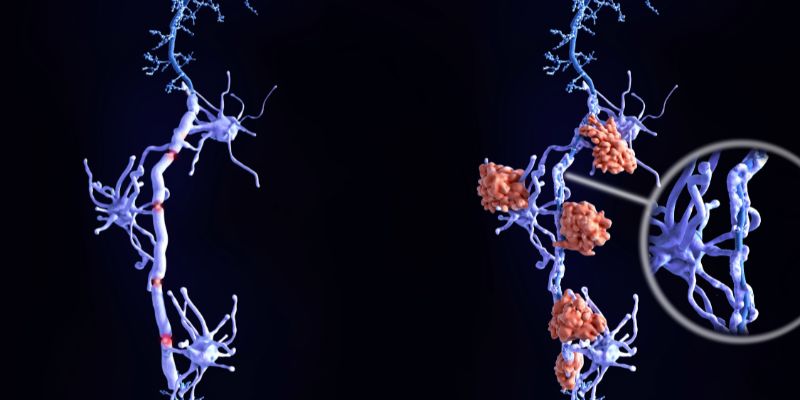Since the immune system incorrectly identifies healthy tissue as foreign, people with MS often experience repeated assaults on the same area of their bodies. Myelin sheaths protect nerve fibers in the brain and spinal cord, and MS damages them. The tissue surrounding your nerves helps transport electrical signals from your brain to the other parts of your body and shields the nerves from damage.
MRI scans can detect inflammation in the myelin sheath, manifesting as tiny patches (plaques or lesions) caused by the assaults. These inflamed areas have the potential to impede the transmission of nerve impulses. It can retard their progress, scramble their data, divert them in the opposite direction, or prevent them from passing altogether.
The manifestation of MS symptoms and signs directly results from this imbalance. Scarring of the myelin sheath may be left when inflammation subsides (sclerosis). Damage to the underlying nerves can occur if these assaults are severe enough or happen frequently enough.

How Is A Diagnosis Of Multiple Sclerosis Made?
There is no reliable method of diagnosing MS. Your healthcare physician will do a physical exam to understand the factors contributing to your symptoms. In addition to that, you could undergo imaging tests like an MRI and blood testing.
A multiple sclerosis diagnosis can be made based on the presence of lesions, which are damaged regions, in the brain or spinal cord of a patient undergoing an MRI. The myelin sheath surrounding the nerves can become damaged, leading to lesions. In addition to that, a spinal tap, commonly known as a lumbar puncture, can be required.
If these examinations do not yield a definitive result, your neurologist may advise you to undergo an evoked potentials test. Your nerve function will be evaluated with this test, which measures the electrical activity in your brain and spinal cord.
5 Common MS Triggers And How To Avoid Them
Depression
Multiple sclerosis patients frequently struggle with feelings of depression (MS). Up to half of all persons who have MS will, at some time in the course of their disease, experience symptoms of depression that are severe enough to call for professional help.
A stressful circumstance or emotional strain can sometimes bring on feelings of depression. It is not hard to see how having multiple sclerosis (MS), which has the potential to develop into a lifelong impairment over time, may lead to depression.
There is some evidence that multiple sclerosis contributes to depression. The insulating myelin that covers the nerves that send impulses controlling mood might be impacted by multiple sclerosis. Certain medications used to treat multiple sclerosis cases, such as steroids or interferon, can also cause depression as a side effect.
Heat
Extreme heat might bring on a relapse. You should avoid saunas, hot tubs, and really hot showers or baths if you are easily influenced by heat. As a rule, heat exhaustion is a common side effect of summertime. Likewise, try not to go outside if you can help it if it's a hot day.
Two things that can assist are taking a chilly shower and turning on the air conditioning. Ice packs or chilled gel packs can also help you feel more at ease, and special caps and clothing are designed to contain them.
Motorized cold water vests are another option; they work by circulating water at a low temperature throughout the body. If you want to become in shape, it's best to break up your workouts into shorter sessions and give yourself a break.
Fatigue
One of the most prevalent symptoms of multiple sclerosis, fatigue, is caused by damage to the neurological system and can affect as many as 90 percent of those with the condition. MS fatigue, on the other hand, tends to come on more suddenly, continue for a longer period, and require more time to recover from.
It may only last for a short period, as in the case of a relapse, an infection, another disease unrelated to MS, or the beginning of treatment with certain MS drugs. Alternatively, it may continue (chronic) even after the person rests. Even if you have had a restful night of sleep, you may still experience exhaustion in the morning if you have multiple sclerosis (MS).

Sensation Changes
Alterations in sensations, such as numbness, pins and needles, and tingling, are frequent MS symptoms, and they are associated with damage to the nerve covering in some sections of the body. These feelings can manifest themselves all over the body, including the arms, legs, and face, among other places.
They can be quite moderate or significantly hinder your ability to utilize the afflicted area of your body, such as making it difficult for you to write with a pen. Your multiple sclerosis healthcare team should be notified as early as possible if you have a new development of sensory symptoms since this might indicate a relapse.
Anxiety
Anxiety problems may be very disruptive for people living with MS, especially at the outset of the disease course, around the time of diagnosis, but also during relapses and other shifts in the course of the disease. When dealing with the emotional toll that a disease as complicated and unpredictable as MS may take, working with a healthcare expert, such as a psychologist, might be helpful.
When dealing with a long-term health condition, learning effective coping and behavior skills can pay dividends for the rest of your life. If you've observed anxiety, you must talk to your doctor, MS nurse, or neurologist as soon as possible to get treatment.
Conclusion:
Exacerbation sufferers should get in touch with a physician without delay. Exacerbations are not always treatable. Symptoms that aren't life-threatening, including weariness, usually go away independently.
Nonetheless, medication may be recommended to control particular symptoms, such as visual abnormalities and muscular weakness, as determined by a doctor. Treatment options for multiple sclerosis (MS) vary from patient to patient and from symptom to symptom.
Multiple sclerosis patients who use disease-modifying treatments (DMTs) for the long term see a decrease in the number and intensity of their flare-ups. Upon receiving a diagnosis of multiple sclerosis, a physician may advise beginning treatment with these medications.




